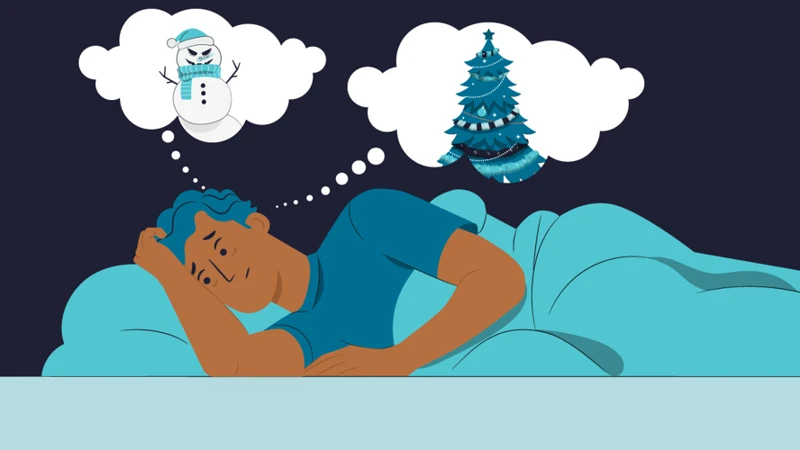Have you ever woken up from a nightmare with your heart pounding, drenched in sweat, and feeling a sense of terror? We all experience dreams, both pleasant and disturbing, but have you ever wondered if a dream could be so intense that it could actually be fatal? In this article, we will delve into the intriguing question of whether you can die from a dream. We will explore the meaning and impact of nightmares, uncovering the psychological interpretations, symbolism, and unresolved issues that may lie beneath their surface. Additionally, we will examine the real-life consequences of nightmares, such as sleep disruption, fatigue, emotional distress, and anxiety. Finally, we will provide some practical strategies that can help you cope with nightmares, including keeping a dream journal and seeking professional help when needed. So, let’s embark on this captivating journey into the fascinating realm of dreams and nightmares!
Can You Die From a Dream?

Have you ever wondered if your dreams could have such a profound impact on your life that they could potentially lead to your demise? While the idea may seem unlikely, it is important to explore the question: Can you die from a dream? Dreams have long been a source of fascination and mystery, and nightmares, in particular, can evoke intense emotions and physical sensations. Although there have been no documented cases of someone dying directly as a result of a dream, the fear and stress experienced during a nightmare can trigger a biological response that may have detrimental effects on one’s health. In fact, research has shown that nightmares can lead to sleep disruption and fatigue, as well as emotional distress and anxiety. So, while dreams may not directly cause death, they can certainly have a significant impact on our overall well-being.
1. Understanding Dreams and Nightmares
Dreams and nightmares have long captivated human curiosity and intrigue. They are a natural part of our sleep cycle and play a crucial role in our mental and emotional well-being. Dreams occur during the rapid eye movement (REM) stage of sleep and can be vivid, surreal experiences that often reflect our subconscious thoughts and desires. Nightmares, on the other hand, are particularly distressing dreams that can leave us feeling frightened and anxious upon awakening. While the exact purpose of dreams and nightmares is still a subject of debate among experts, they are believed to serve various functions, including memory consolidation, problem-solving, emotional processing, and self-expression. Understanding the nature of dreams and nightmares can provide valuable insights into our inner workings and help us navigate our waking lives more effectively. So, let’s delve deeper into the fascinating realm of dreams and unlock the secrets they hold.
2. The Biological Response to Fear
The biological response to fear is a complex and innate reaction that helps us navigate dangerous situations. When we experience fear, our body releases stress hormones such as adrenaline, triggering a fight-or-flight response. This response prepares us to either confront the threat or flee from it. During nightmares, the brain perceives the threatening aspects of the dream as real, leading to a cascade of physiological reactions. Heart rate and blood pressure may increase, and breathing may become rapid and shallow. These physical changes can be distressing and may contribute to the feeling of impending doom that can occur during a nightmare. While the biological response to fear does not directly cause death, the resulting stress and tension can have a negative impact on our overall well-being. Understanding this biological response can help us recognize the importance of managing and coping with nightmares to protect our mental and physical health.
Exploring the Meaning of Nightmares

Nightmares, with their vivid and often frightening imagery, have long captivated the human imagination. People have been intrigued by the meaning behind these unsettling dreams and the potential messages they may hold. Exploring the meaning of nightmares can provide valuable insights into our psyche and help us understand our innermost fears and anxieties. Psychological interpretations suggest that nightmares often represent unresolved emotional issues or traumatic experiences that continue to haunt us. They serve as a manifestation of our deepest fears, serving as a subconscious warning or a call for us to address these underlying concerns. Symbolism is also a significant aspect of nightmares, with certain objects or scenarios carrying hidden meanings. For instance, dreaming of a snake may symbolize hidden threats or deceit, while dreaming of flying could represent a desire for freedom or escape. By unraveling the symbolism and exploring the themes in nightmares, we can gain a deeper understanding of ourselves and our subconscious mind. So, next time you wake up in a cold sweat from a terrifying dream, take a moment to analyze its meaning and uncover the hidden messages it may hold.
Reading List:
– Do you know the symbolic meaning of dreaming of baby animals?
– The significance of dreaming about an airport terminal.
– Understanding the symbolism of dreams involving wild animals.
1. Psychological Interpretations
Psychological interpretations of nightmares delve into the underlying emotions and experiences that may be influencing the content and intensity of our dreams. Dreams are often seen as a reflection of our subconscious mind, and nightmares can be particularly revealing in this regard. Some theories suggest that nightmares may be a manifestation of repressed fears, traumatic experiences, or unresolved conflicts. For example, recurring nightmares about falling could symbolize a fear of losing control or a lack of stability in one’s life. Exploring the psychological interpretations of nightmares can provide valuable insight into our innermost thoughts, fears, and desires, ultimately helping us gain a deeper understanding of ourselves and our emotional well-being.
2. Symbolism and Unresolved Issues
Symbolism in dreams plays a significant role in understanding their meaning and exploring unresolved issues in our lives. Dreams often use symbols and metaphors to represent deeper emotions, desires, and conflicts. For example, dreaming about water could symbolize emotions or the unconscious mind, while dreaming about flying could represent a sense of freedom or escape. These symbolic elements can provide valuable insights into our subconscious and help us uncover unresolved issues that may be affecting our daily lives. By analyzing and interpreting the symbolism in our dreams, we can gain a deeper understanding of ourselves and work towards resolving these underlying issues. It is important to keep a dream journal and reflect on recurring symbols to unlock the hidden meanings within our dreams.
The Impact of Nightmares on Daily Life

Nightmares have a profound impact on our daily lives, extending far beyond the confines of our sleep. One of the major consequences of experiencing nightmares is sleep disruption. Nightmares can jolt us awake in the middle of the night, leaving us feeling exhausted and drained the next day. This lack of quality sleep can lead to fatigue, difficulty concentrating, and decreased productivity. The emotional distress caused by nightmares can linger long after we wake up. The feelings of fear, anxiety, and unease can persist throughout the day, affecting our mood, relationships, and overall well-being. The intrusive nature of nightmares can also make it challenging to shake off the lingering sense of dread, causing us to be on edge and more susceptible to stressors in our daily lives. It is evident that nightmares can have a significant impact on our daily functioning, both physically and emotionally.
1. Sleep Disruption and Fatigue
Sleep disruption caused by nightmares can have a profound impact on our daily lives. When we experience a particularly frightening dream, it can jolt us awake, leaving us feeling anxious and restless. This sleep disturbance can lead to difficulty falling back asleep, resulting in fragmented and insufficient sleep. The resulting fatigue can leave us feeling exhausted and drained throughout the day, affecting our productivity, concentration, and overall quality of life. It is
Subscribe to Our Newsletter
Sign up to receive the latest news and updates.
2. Emotional Distress and Anxiety
Emotional distress and anxiety are common consequences of nightmares. When we experience a particularly disturbing dream, it can leave us feeling unsettled and deeply affected even after we wake up. The intense emotions elicited during a nightmare can linger, causing ongoing distress throughout the day. Individuals may struggle with intrusive thoughts and memories of the unpleasant dream, leading to heightened levels of anxiety and difficulty in managing daily tasks. It is important to acknowledge and address these emotional effects to maintain our mental well-being and overall quality of life. Seeking support from loved ones or professional help can be beneficial in managing the emotional distress and anxiety that may arise from nightmares.
Ways to Cope With Nightmares
Nightmares can be incredibly distressing, disrupting our sleep and leaving us feeling anxious and unsettled. Fortunately, there are effective strategies to help cope with these nighttime terrors. One powerful technique is keeping a dream journal. By recording your dreams upon waking, you can gain a deeper understanding of their themes and patterns, and potentially uncover unresolved issues that may be contributing to your nightmares. Another way to cope is by practicing relaxation techniques before bed, such as deep breathing or meditation, to calm your mind and reduce anxiety. Seeking professional help from a therapist or counselor who specializes in dream analysis can also be beneficial, allowing you to explore the underlying causes of your nightmares and develop strategies to manage them. Remember, you are not alone, and there are resources available to help you navigate the unsettling world of nightmares and find a sense of peace and tranquility during your sleep.
1. Keeping a Dream Journal
Keeping a dream journal is a helpful practice for those who experience nightmares and want to gain insight into their dreams. By recording your dreams immediately upon waking, you can capture the details and emotions fresh in your mind. This can provide valuable information for later reflection and analysis. In your dream journal, write down any symbols, themes, or recurring patterns that you notice. Additionally, note any emotions or sensations you experienced during the dream. Over time, you may start to see connections between your dreams and events in your daily life. Keeping a dream journal can also help you identify triggers for nightmares and develop strategies to cope with them effectively.
2. Seeking Professional Help
When nightmares become persistent and start interfering with your daily life, seeking professional help can be a valuable option. There are a variety of professionals who specialize in dream analysis and therapy, such as psychologists, psychiatrists, and licensed therapists. They can provide a safe and supportive environment for you to explore the underlying causes of your nightmares and develop effective coping strategies. Therapy may involve techniques such as cognitive-behavioral therapy (CBT), which helps to identify and challenge negative thought patterns and behaviors associated with nightmares. Additionally, professionals may use techniques like desensitization and reprocessing to help you process and reduce the emotional distress caused by recurring nightmares. Remember, seeking help from a trained professional can be an important step towards finding relief from your nightmares and improving your overall well-being.
Conclusion
In conclusion, while it may not be possible to physically die from a dream, the impact of nightmares on our mental and emotional well-being should not be underestimated. Dreams and nightmares serve as a window into our subconscious minds, revealing our fears, unresolved issues, and emotions. They can disrupt our sleep, leaving us fatigued and emotionally distressed. It is important to acknowledge and address any distressing dreams that we may experience, as they can have a lasting impact on our daily lives. Coping mechanisms such as keeping a dream journal and seeking professional help when necessary can be effective in managing the effects of nightmares. By understanding the meaning and significance of our dreams, we can gain insights into ourselves and work towards resolving any underlying issues. So, embrace the fascinating realm of dreams, but remember to take care of your mental and emotional well-being along the way.
Frequently Asked Questions
1. Can nightmares really be fatal?
While there have been no documented cases of someone dying directly from a nightmare, the intense fear and stress experienced during a nightmare can have a negative impact on a person’s health and well-being.
2. Why do we experience nightmares?
Nightmares can be caused by a variety of factors, including underlying psychological issues, unresolved traumas, stress, anxiety, medication side effects, and sleep disorders.
3. What is the purpose of dreams?
The purpose of dreams is still not fully understood, but they are believed to play a role in processing emotions, consolidating memories, problem-solving, and even providing insight into one’s unconscious thoughts and desires.
4. Can dreams predict the future?
While some people claim to have had precognitive dreams, there is no scientific evidence to support the idea that dreams can predict the future. Dreams are often influenced by our subconscious mind and personal experiences.
5. How can nightmares affect our sleep?
Nightmares can disrupt sleep by causing frequent awakenings and difficulty falling back asleep. This can lead to poor sleep quality, daytime fatigue, and difficulty concentrating.
6. Can recurring nightmares be treated?
Yes, recurring nightmares can be treated. Techniques such as imagery rehearsal therapy, cognitive behavioral therapy, and relaxation techniques can help individuals reduce the frequency and intensity of recurring nightmares.
7. Is it possible to control our dreams?
Yes, it is possible to influence and control our dreams through techniques such as lucid dreaming. Lucid dreaming is when a person becomes aware that they are dreaming and can actively participate and manipulate the dream content.
8. Are all nightmares a result of underlying psychological issues?
No, not all nightmares are solely a result of underlying psychological issues. Nightmares can also be triggered by external factors such as certain medications, substance abuse, sleep disorders, or traumatic events.
9. Are there any benefits to having nightmares?
While nightmares can be distressing, they can also serve a purpose. They can act as a warning sign, highlighting unresolved issues, fears, or anxieties. They may also provide an opportunity for personal growth and introspection.
10. When should I seek professional help for nightmares?
If your nightmares are frequent, recurring, or significantly impacting your quality of life, it may be beneficial to seek professional help. A therapist or sleep specialist can help identify underlying causes and provide appropriate treatment options.










